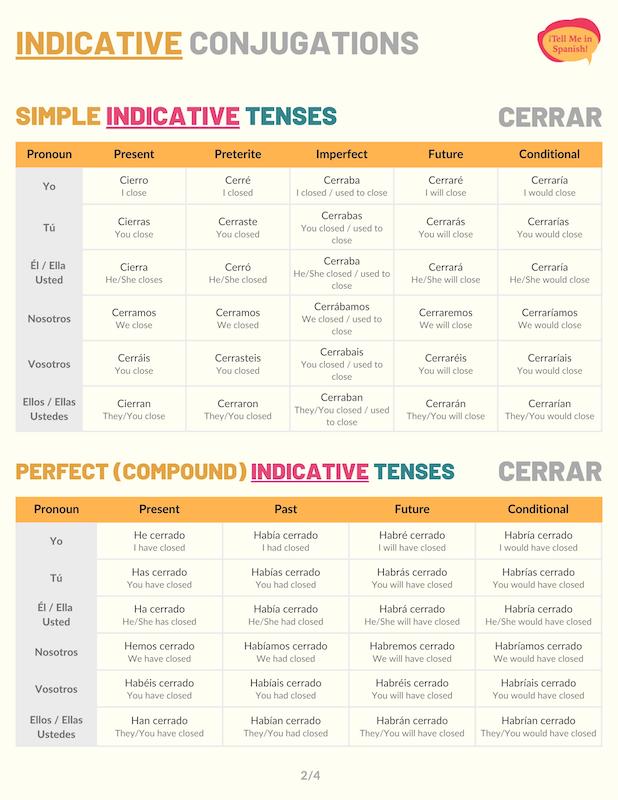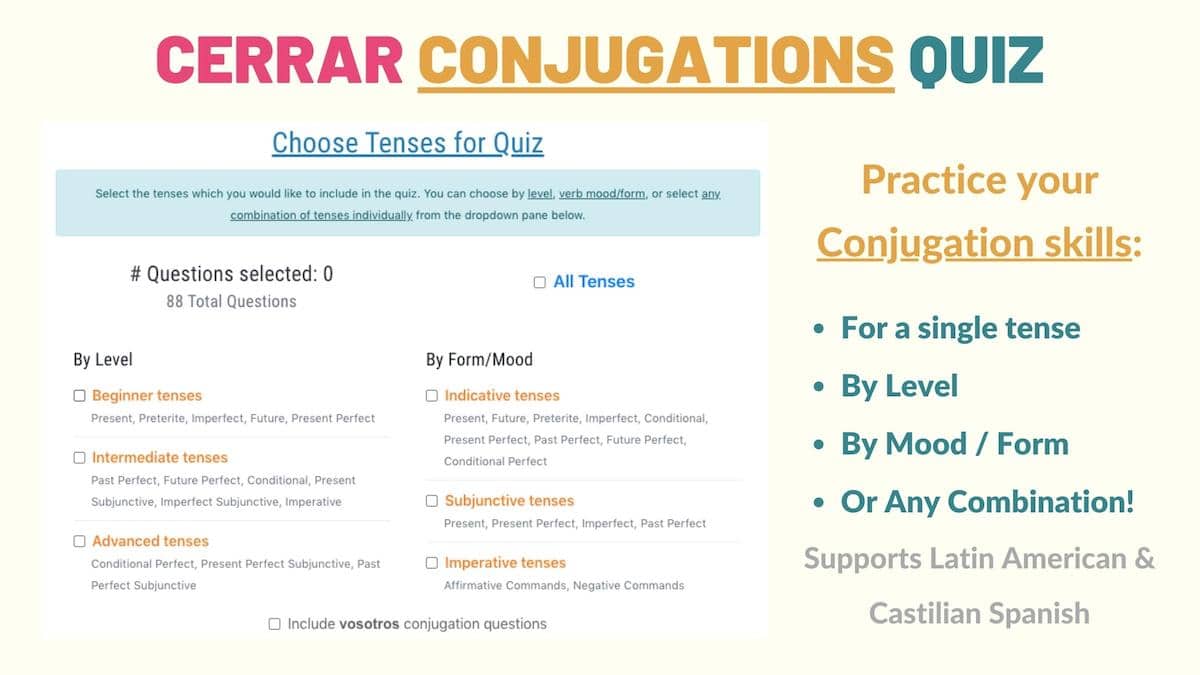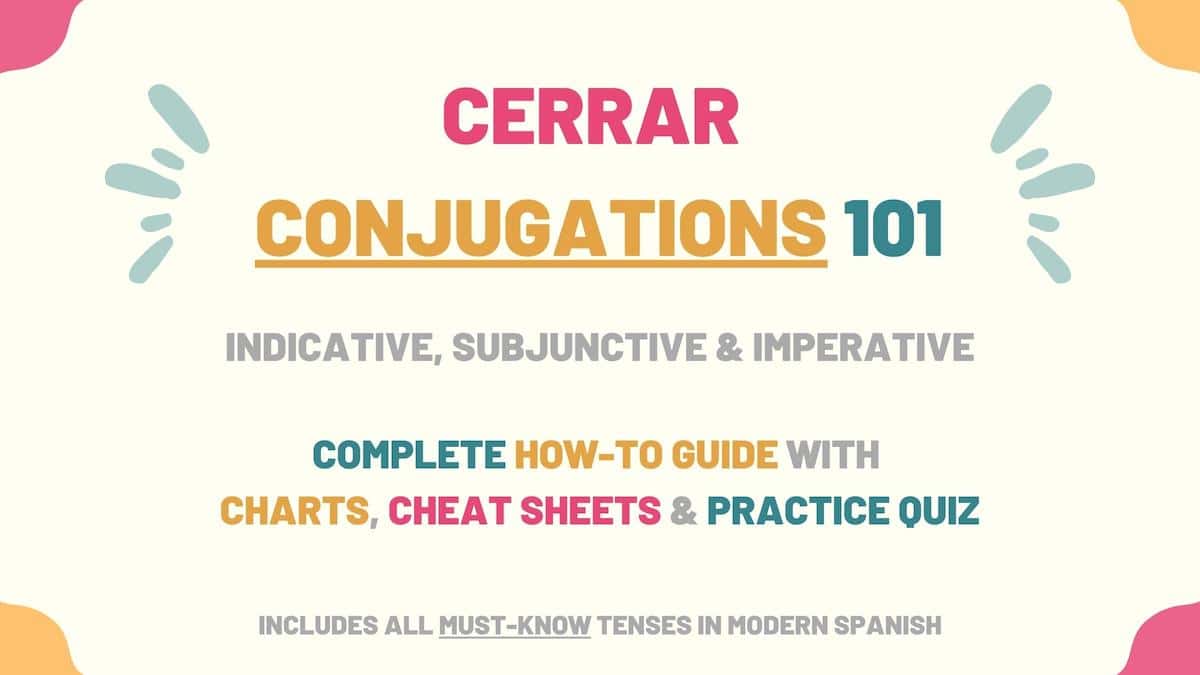Cerrar is a common -AR verb that you’ll use in many different everyday situations. Since it has some stem-changes you must keep in mind, in this guide, we’ll explore how to conjugate cerrar in Spanish. Here is a quick overview of what you’ll learn:
- Cerrar Overview
- Indicative Tenses of Cerrar Conjugations
- Subjunctive Tenses of Cerrar Conjugations
- Imperative (Commands) of Cerrar Conjugations
- Uses & Examples
- Download Cerrar Conjugation Tables & Uses Cheat sheets
- Cerrar Conjugation Practice Quiz
Take Note: There are many tenses in Spanish. However, we don’t use them all. Many are simply old and outdated. As a result, in this guide, you’ll only learn the tenses you need to know to become fluent in Spanish.
Overview of Cerrar
| Verb Characteristic | Property |
|---|---|
| Verb Type | -AR |
| Irregular | No |
| Infinitive | Cerrar |
| Gerund (Present Participle) Form | Cerrando |
| Past Participle Form | Cerrado |
| Synonyms | Tapar, obstruir, cicatrizar |
Stem Changes: E to IE
- Present tense: cierr for all subject pronouns except ‘nosotros’ and ‘vosotros’.
- Present subjunctive: cierr for all subject pronouns except ‘nosotros’ and ‘vosotros’.
- Affirmative imperative: cierr for all subject pronouns except ‘vosotros’.
- Negative imperative: cierr for all subject pronouns.
Indicative Conjugations of Cerrar
Present tense
The present tense conjugations of cerrar have an E to IE stem-change for all subjects except ‘nosotros’ and ‘vosotros’. In this tense, cerrar can be used to talk about closing doors/ports, objects, or closing hours. Hoy cerramos a las 7.
| Person | Conjugation | Translation |
|---|---|---|
| Yo | Cierro | I close |
| Tú | Cierras | You close |
| Él / Ella Usted | Cierra | He/She closes You (formal) close |
| Nosotros | Cerramos | We close |
| Vosotros | Cerráis | You close |
| Ellos / Ellas Ustedes | Cierran | They close You (plural) close |
Preterite tense
Cerrar’s preterite conjugations are all regular. The preterite tense of ‘cerrar’ communicates that something was closed at a specific moment in the past. For example: Jill cerró la ventana ayer en la noche.
| Person | Conjugation | Translation |
|---|---|---|
| Yo | Cerré | I closed |
| Tú | Cerraste | You closed |
| Él / Ella Usted | Cerró | He/She closed You (formal) closed |
| Nosotros | Cerramos | We closed |
| Vosotros | Cerrasteis | You closed |
| Ellos / Ellas Ustedes | Cerraron | They closed You (plural) closed |
Imperfect tense
In Spanish, the imperfect forms of cerrar refer to things people used to close repeatedly or at an unspecified moment in the past. La escuela cerraba a las 8. In this tense, ‘cerrar’ can be translated as ‘used to close’ or ‘closed’.
| Person | Conjugation | Translation |
|---|---|---|
| Yo | Cerraba | I closed I used to close |
| Tú | Cerrabas | You closed You used to close |
| Él / Ella Usted | Cerraba | He/She closed He/She used to close You (formal) closed You (formal) used to close |
| Nosotros | Cerrábamos | We closed We used to close |
| Vosotros | Cerrabais | You closed You used to close |
| Ellos / Ellas Ustedes | Cerraban | They closed They used to close You (plural) closed You (plural) used to close |
Near future
Cerrar in the near future refers to things you plan to close at some point in the immediate future. For instance: voy a cerrar la puerta en unos minutos. The near future is formed with ir (present) + a + cerrar and can be translated as “going to close”.
| Person | Conjugation | Translation |
|---|---|---|
| Yo | Voy a cerrar | I’m going to close |
| Tú | Vas a cerrar | You’re going to close |
| Él / Ella Usted | Va a cerrar | He/She is going to close You (formal) are going to close |
| Nosotros | Vamos a cerrar | We’re going to close |
| Vosotros | Vais a cerrar | You’re going to close |
| Ellos / Ellas Ustedes | Van a cerrar | They’re going to close You (plural) are going to close |
Future simple tense
The future forms of cerrar communicate that someone will close something at some point in the future. Cerraremos esta cuenta en unos meses.
| Person | Conjugation | Translation |
|---|---|---|
| Yo | Cerraré | I will close |
| Tú | Cerrarás | You will close |
| Él / Ella Usted | Cerrará | He/She will close You (formal) will close |
| Nosotros | Cerraremos | We will close |
| Vosotros | Cerraréis | You (formal) will close |
| Ellos / Ellas Ustedes | Cerrarán | They will close You (plural) will close |
Conditional tense
In the conditional tense, cerrar allows you to talk about things people would close if certain circumstances were met. For example: Bill dijo que si no había gente, hoy cerraría temprano.
| Person | Conjugation | Translation |
|---|---|---|
| Yo | Cerraría | I would close |
| Tú | Cerrarías | You would close |
| Él / Ella Usted | Cerraría | He/She would close You (formal) would close |
| Nosotros | Cerraríamos | We would close |
| Vosotros | Cerraríais | You would close |
| Ellos / Ellas Ustedes | Cerrarían | They would close You (plural) would close |
Present perfect tense
We use the present perfect of ‘cerrar’ to express that someone has or hasn’t closed something. Todavía no han cerrado la tienda. With this verb, the formula for the present perfect in Spanish is: ‘haber’ in the present tense + cerrado.
| Person | Conjugation | Translation |
|---|---|---|
| Yo | He cerrado | I have closed |
| Tú | Has cerrado | You have closed |
| Él / Ella Usted | Ha cerrado | He/She has closed You (formal) have closed |
| Nosotros | Hemos cerrado | We have closed |
| Vosotros | Habéis cerrado | You have closed |
| Ellos / Ellas Ustedes | Han cerrado | They have closed You (plural) have closed |
Past perfect
The past perfect conjugations of cerrar imply that someone closed something before some other reference point in the past. Cuando llegué, el restaurante ya había cerrado. To conjugate the past perfect, we use the formula haber (imperfect form) + cerrado (cerrar’s past participle form).
| Person | Conjugation | Translation |
|---|---|---|
| Yo | Había cerrado | I had closed |
| Tú | Habías cerrado | You had closed |
| Él / Ella Usted | Había cerrado | He/She had closed You (formal) had closed |
| Nosotros | Habíamos cerrado | We had closed |
| Vosotros | Habíais cerrado | You had closed |
| Ellos / Ellas Ustedes | Habían cerrado | They had closed You (plural) had closed |
Future perfect
The future perfect conjugations of cerrar expresses that a place will close by or before a certain time in the future. For instance: cuando lleguemos, ya habrán cerrado. The structure to form this tense is haber to the future tense and cerrado (the past participle of ‘cerrar’).
| Person | Conjugation | Translation |
|---|---|---|
| Yo | Habré cerrado | I will have closed |
| Tú | Habrás cerrado | You will have closed |
| Él / Ella Usted | Habrá cerrado | He/She will have closed You (formal) will have closed |
| Nosotros | Habremos cerrado | We will have closed |
| Vosotros | Habréis cerrado | You will have closed |
| Ellos / Ellas Ustedes | Habrán cerrado | They will have closed You (plural) will have closed |
Conditional perfect
In the conditional perfect, cerrar allows you to talk about places that would have closed if a past condition had been fulfilled. For example: habríamos cerrado antes, pero no pudimos.
| Person | Conjugation | Translation |
|---|---|---|
| Yo | Habría cerrado | I would have closed |
| Tú | Habrías cerrado | You would have closed |
| Él / Ella Usted | Habría cerrado | He/She would have closed You (formal) would have closed |
| Nosotros | Habríamos cerrado | We would have closed |
| Vosotros | Habríais cerrado | You would have closed |
| Ellos / Ellas Ustedes | Habrían cerrado | They would have closed You (plural) would have closed |
Progressive tenses
The progressive tenses of ‘cerrar’ communicate that someone is closing something at the moment of speaking. For instance: ¿por qué están cerrando las ventanas? The progressive tenses are formed with the structure: estar (conjugated) + gerund form of cerrar (cerrando).
| Progressive Tense | Formula | Translation Example |
|---|---|---|
| Present | Estar (present) + cerrando | I am closing |
| Preterite | Estar (preterite) + cerrando | You were closing |
| Imperfect | Estar (imperfect) + cerrando | He was closing |
| Future | Estar (future) + cerrando | We will be closing |
| Conditional | Estar (conditional) + cerrando | They would be closing |
Cerrar Subjunctive Conjugations
In Spanish, the subjunctive is used to talk about wishes, hypothetical situations or express uncertainty. The conjugation charts below show the subjunctive forms of cerrar.
Present subjunctive
Cerrar subjunctive conjugations express wishes, suggestions, expectations or uncertainties about closing a place. For instance: ojalá que cierren más tarde. The subjunctive forms of ‘cerrar’ have a stem change from E to IE for all subjects except ‘nosotros’ and ‘vosotros’.
| Person | Conjugation | Translation |
|---|---|---|
| Yo | Cierre | I close |
| Tú | Cierres | You close |
| Él / Ella Usted | Cierre | He/She closes You (formal) close |
| Nosotros | Cerremos | We close |
| Vosotros | Cerréis | You close |
| Ellos / Ellas Ustedes | Cierren | They close You (plural) close |
Present perfect subjunctive
Haber in the present subjunctive + cerrado is the structure you should use to form the present perfect subjunctive of ‘cerrar’. With this tense, ‘cerrar’ is used to communicate uncertainty about closing something. ¿Crees que Juan haya cerrado las ventanas?
| Person | Conjugation | Translation |
|---|---|---|
| Yo | Haya cerrado | I have closed |
| Tú | Hayas cerrado | You have closed |
| Él / Ella Usted | Haya cerrado | He/She has closed You (formal) have closed |
| Nosotros | Hayamos cerrado | We have closed |
| Vosotros | Hayáis cerrado | You have closed |
| Ellos / Ellas Ustedes | Hayan cerrado | They have closed You (plural) have closed |
Imperfect subjunctive
Cerrar in the imperfect subjunctive is used to talk about things we wanted to close or to express past uncertainty about closing a place. For example: no sabía que cerraran tan temprano.
The imperfect subjunctive has two conjugation models depending on which type of Spanish you’re using:
Latin American Spanish version
| Person | Conjugation | Translation |
|---|---|---|
| Yo | Cerrara | I closed |
| Tú | Cerraras | You closed |
| Él / Ella Usted | Cerrara | He/She closed You (formal) closed |
| Nosotros | Cerráramos | We closed |
| Ellos / Ellas Ustedes | Cerraran | They closed You (plural) closed |
Note: The table above doesn’t include the conjugation for vosotros because this pronoun is not used in Latin American Spanish.
Castilian Spanish version
| Person | Conjugation | Translation |
|---|---|---|
| Yo | Cerrase | I closed |
| Tú | Cerrases | You closed |
| Él / Ella Usted | Cerrase | He/She closed You (formal) closed |
| Nosotros | Cerrásemos | We closed |
| Vosotros | Cerraseis | You closed |
| Ellos / Ellas Ustedes | Cerrasen | They closed You (plural) closed |
Past perfect subjunctive
The past perfect subjunctive of cerrar expresses that someone would have closed a place if a past circumstance was met. You can also use this tense to communicate regret about not closing something. Si hubieras cerrado las ventanas, no habría entrado agua.
| Person | Conjugation | Translation |
|---|---|---|
| Yo | Hubiera cerrado | I had closed |
| Tú | Hubieras cerrado | You had closed |
| Él / Ella Usted | Hubiera cerrado | He/She had closed You (formal) had closed |
| Nosotros | Hubiéramos cerrado | We had closed |
| Vosotros | Hubierais cerrado | You had closed |
| Ellos / Ellas Ustedes | Hubieran cerrado | They had closed You (plural) had closed |
Cerrar Imperative Conjugations
The Spanish imperative mood is used to instruct people on what to do (affirmative imperative) as well as what not to do (negative imperative).
Affirmative commands
The affirmative commands of cerrar allow you to order people to close something. With the exception of ‘vosotros’, the imperative forms of ‘cerrar’ have an E to IE stem change.
| Person | Conjugation | Translation |
|---|---|---|
| Tú | Cierra | Close |
| Usted | Cierre | Close |
| Vosotros | Cerrad | Close |
| Ustedes | Cierren | Close |
Negative commands
We use the negative imperative to tell people to not close a thing or place. For example: no cierres la puerta. The negative commands of ‘cerrar’ are stem-changing conjugations with the exception of ‘vosotros’.
| Person | Conjugation | Translation |
|---|---|---|
| Tú | No cierres | Don’t close |
| Usted | No cierre | Don’t close |
| Vosotros | No cerréis | Don’t close |
| Ustedes | No cierren | Don’t close |
Meanings of Cerrar & Examples
Cerrar is the direct translation of ‘to close’. So, now that you’ve learned cerrar conjugation charts, below are some examples of how to use this verb in Spanish.
[Cerrar conjugated] + [complement]
¿Cerraste la llave?
Did you close the tap?
Chicos, no cerréis las ventanas.
Guys, don’t close the windows.
Ojalá Jesús cierre el trato.
Hopefully, Jesus closes the deal.
Si hubieras cerrado tu mochila, no habrías perdido tu cartera.
If you had closed your bag, you wouldn’t have lost your wallet.
Download Cerrar Conjugation Tables & Uses Cheat sheets

I’ve created a PDF that you can download which contains all of the conjugation tables, characteristics, and uses of ‘cerrar’ so you can study it anytime you choose!
Practice Quiz: Cerrar Conjugation

Now that you’ve learned how to conjugate cerrar in Spanish, you can practice your skills by taking the cerrar conjugation practice quiz.



